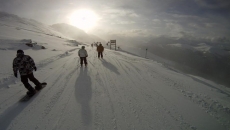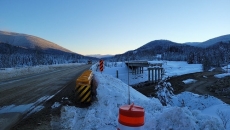WINNIPEG - A Florida man has been charged with human smuggling after the bodies of four people, including a baby and a teen, were found in Manitoba near the United States border.
The United States Attorney's Office for the District of Minnesota said Steve Shand, 47, appeared in court earlier Thursday.
The bodies were found Wednesday near the border community of Emerson, Man.
Mounties said it's believed they died from exposure while trying to cross the border into the U.S. from Canada.
The U.S. Attorney's Office said the dead were a family of four Indian nationals who were separated from others in a group crossing the border.
"It is an absolute and heartbreaking tragedy," RCMP Assistant Commissioner Jane MacLatchy told a news conference.
MacLatchy said U.S. authorities notified RCMP on Wednesday about a different group of people who had been apprehended after crossing into the United States from near Emerson.
That group had items for an infant but no baby was with them. It led authorities to believe a child and others may be missing, RCMP said.
Mounties immediately began a search. MacLatchy said it covered difficult ground with deep and drifting snow. Officers used all-terrain vehicles to get around because it was "virtually impassable."
Officers found three bodies together — a man, a woman and a baby — just 10 metres from the border. The search continued and a teen boy was found a short distance away. They were wearing winter clothing, MacLatchy said, but with the frigid conditions it would not have been enough to save them.
A search for possible survivors or additional victims continued Wednesday night and officers were still patrolling the area Thursday, RCMP said. No one else was found.
"We are very concerned that this attempted crossing may have been facilitated in some way and that these individuals, including an infant, were left on their own in the middle of a blizzard when the weather hovered around -35 C with the wind," MacLatchy said.
"These victims faced not only the cold weather but also endless fields, large snowdrifts and complete darkness."
MacLatchy said others are often involved in arranging to bring people across the border, which is criminal and extremely dangerous. In the past, it has been more common to see crossings north from the U.S. into Canada, she added.
Border crossings into Canada on foot increased in 2016 following the election of former U.S. president Donald Trump.
That December, two men lost their fingers to severe frostbite after getting caught in a blizzard while walking from the U.S. into Manitoba. A few months later, a woman died of hypothermia near the border on the American side.
In 2019, a pregnant woman who walked across the border was rescued after she became trapped in a snowbank and went into labour.
Emerson-Franklin Reeve Dave Carlson said instances of people crossing the border outside the checkpoint have dropped significantly in recent years. He was surprised to learn of the four deaths.
"If you look at the political climate on both sides of the border, it's just mind-boggling to me that anyone had that sense of desperation to try and cross in extreme conditions."
It has been extremely cold and windy in recent days, Carlson said. The area where the bodies were found is far enough away that people would not see lights from the town, he said, and it would be easy to get disoriented.
The RCMP said it is working with U.S. Customs and Border Protection and the U.S. Department of Homeland Security.
Deputy Patrick Klegstad with the Kittson County Sheriff's Office in Minnesota said his department is supporting the American side of the investigation. Its officers patrol the "desolate" open fields near the border every day, he said.
He is puzzled why the four tried to cross where they did.
"Why they picked that spot to travel would be the million-dollar question."
The weather this week was so cold that it "takes your breath away," Klegstad said. There are no trees or shelter near the border, only quiet and inaccessible farm roads.
Klegstad, echoing Canadian officials, said it's uncommon to have people make the harrowing journey from Canada into the U.S.
"It's not very often we do have southbounders."
Mounties warned that people should not attempt to cross the border outside a checkpoint, in either direction, because it can be deadly.
"Do not listen to anyone who tells you they can get you to your destination safely. They cannot," MacLatchy said.






